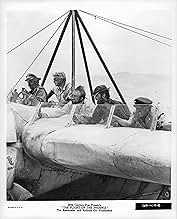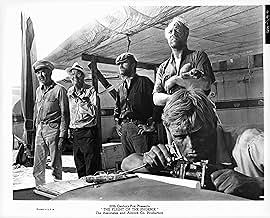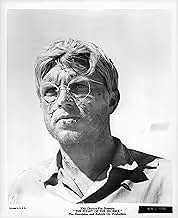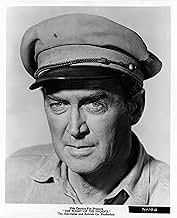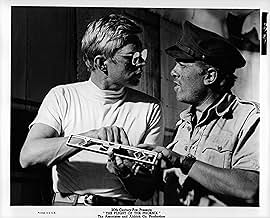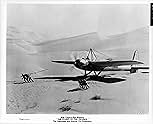ÉVALUATION IMDb
7,5/10
23 k
MA NOTE
Après un accident d'avion au Sahara, l'un des survivants dit qu'il est un concepteur d'avion et qu'ils peuvent fabriquer un avion pilotable à partir de l'épave.Après un accident d'avion au Sahara, l'un des survivants dit qu'il est un concepteur d'avion et qu'ils peuvent fabriquer un avion pilotable à partir de l'épave.Après un accident d'avion au Sahara, l'un des survivants dit qu'il est un concepteur d'avion et qu'ils peuvent fabriquer un avion pilotable à partir de l'épave.
- Director
- Writers
- Stars
- Nommé pour 2 oscars
- 6 nominations au total
Hardy Krüger
- Heinrich Dorfmann
- (as Hardy Kruger)
Chris Alcaide
- Arab Leader
- (uncredited)
Stanley Ralph Ross
- Arab Singer
- (voice)
- (uncredited)
Avis en vedette
Where as many films with star casts have failed, this one does not.
This film oozes quality by the bucket load. It centres round the story of the survivors of a plane crash who attempt to build a plane out of the wreckage. The tension is apparent from the start with the heat of the desert alone almost driving the characters to madness.
The combination of brilliant script and excellent acting brings to the fore a brilliant film. Ian Bannen, in particular, gives gives both grit and relish in his possibily his greatest screen performance.
This film oozes quality by the bucket load. It centres round the story of the survivors of a plane crash who attempt to build a plane out of the wreckage. The tension is apparent from the start with the heat of the desert alone almost driving the characters to madness.
The combination of brilliant script and excellent acting brings to the fore a brilliant film. Ian Bannen, in particular, gives gives both grit and relish in his possibily his greatest screen performance.
"The Flight of the Phoenix", based on the Elleston Trevor novel, has little more than one set and no costume changes; and the action is confined to the few yards around an airplane crashed in the desert. Yet its story is more gripping than most "action" movies.
An old airplane owned by an oil company crashes at the hands of a crusty old pilot (James Stewart) whose bitterness and fatalism are brought out when he's forced to admit the crash was due to pilot error. His half-alcoholic navigator has insured that the plane was off course, and cannot be discovered by rescue craft (if any); he's a nice guy and becomes the mediator between the rancorous passengers and crew, but he lacks self-confidence (Richard Attenborough in a finely understated performance). The passengers include a company accountant (Dan Duryea); a shell-shocked employee (Ernest Borgnine, by turns touching and silly) sent home in the company of his doctor (Christian Marquand); a straight-laced British officer (Peter Finch) and his mutinous sergeant (Ronald Fraser); several oil company employees, including one who is always making vicious jokes at the expense of the others (Ian Bannen); and a German "designer" (Hardy Kruger) who went to the oil fields to visit his brother.
Stranded in the desert with no hope of rescue, they debate various schemes for salvation, all of which fail, until Kruger tells the others he is an airplane designer and he has discovered a way to build a new plane from the spare parts of the old one. All it needs for a handful of unskilled men, living on a little water and no food but pressed dates, coping with unbearable heat during the day and unbearable cold at night, to transform themselves into aircraft manufacturers before they all succumb.
All performances are good. Some of the actors (George Kennedy, the always interesting Dan Duryea) are woefully underused -- perhaps large segments of their roles wound up on the cutting-room floor. The major tension is the confrontation between Stewart's old-school pilot and Kruger's technologically self-righteous engineer (at one point, Stewart's character makes the incredibly prescient remark that one day the little men with their slide-rules and computers will inherit the earth).
Even when they all decide they'd rather attempt building the new plane with hope than sit around watching each other die, new surprises spring up that compromise the whole thing.
The script and the acting are solid, especially James Stewart in a different and challenging role. The music is sometimes overwhelming, and stings give unnecessary emphasis to some lines. Also of interest is the listing in the credits of "The Love Theme" which seems like a silly thing to call it.
A superlative story of men living on the ragged edge of survival, working together but not necessarily getting along or surrendering their own values.
An old airplane owned by an oil company crashes at the hands of a crusty old pilot (James Stewart) whose bitterness and fatalism are brought out when he's forced to admit the crash was due to pilot error. His half-alcoholic navigator has insured that the plane was off course, and cannot be discovered by rescue craft (if any); he's a nice guy and becomes the mediator between the rancorous passengers and crew, but he lacks self-confidence (Richard Attenborough in a finely understated performance). The passengers include a company accountant (Dan Duryea); a shell-shocked employee (Ernest Borgnine, by turns touching and silly) sent home in the company of his doctor (Christian Marquand); a straight-laced British officer (Peter Finch) and his mutinous sergeant (Ronald Fraser); several oil company employees, including one who is always making vicious jokes at the expense of the others (Ian Bannen); and a German "designer" (Hardy Kruger) who went to the oil fields to visit his brother.
Stranded in the desert with no hope of rescue, they debate various schemes for salvation, all of which fail, until Kruger tells the others he is an airplane designer and he has discovered a way to build a new plane from the spare parts of the old one. All it needs for a handful of unskilled men, living on a little water and no food but pressed dates, coping with unbearable heat during the day and unbearable cold at night, to transform themselves into aircraft manufacturers before they all succumb.
All performances are good. Some of the actors (George Kennedy, the always interesting Dan Duryea) are woefully underused -- perhaps large segments of their roles wound up on the cutting-room floor. The major tension is the confrontation between Stewart's old-school pilot and Kruger's technologically self-righteous engineer (at one point, Stewart's character makes the incredibly prescient remark that one day the little men with their slide-rules and computers will inherit the earth).
Even when they all decide they'd rather attempt building the new plane with hope than sit around watching each other die, new surprises spring up that compromise the whole thing.
The script and the acting are solid, especially James Stewart in a different and challenging role. The music is sometimes overwhelming, and stings give unnecessary emphasis to some lines. Also of interest is the listing in the credits of "The Love Theme" which seems like a silly thing to call it.
A superlative story of men living on the ragged edge of survival, working together but not necessarily getting along or surrendering their own values.
Returning from an oil field with a plane full of crew etc going on leave, Frank Towns' plane enters a sandstorm over the Sahara desert and crashes. As various attempts at rescue or escape fail one passenger, Dorfmann suggests his plan to rebuild the plane as a smaller version and attempt to fly out, leaving the bulk of the damage craft behind. However tensions mount as personalities conflict as all the men face death.
I had only ever heard of this film before I finally got round to watching it last night on television. I was aware of the basic plot and had assumed it was more recent that it actually was. I watched it assuming that it was made in the early seventies when the disaster movie genre was just starting to take off (sorry accidental pun). However this was made prior to this and is probably a much better film for it in the seventies the film would have required more spectacle, so the crash would have been much more dramatic and horrifying. As it is now, the film is more about the men under stress than it is about anything else.
This is brought out well and the majority of the drama and tension within the film is as much from these conflicts as it is from the pressure to escape the desert. The film is longer than I expected it to be but it pretty much sustains itself for that length. The main reason for the film working so well is the cast, which has it's fair share of famous faces but also has more than it's fair share of good performances.
Stewart is really strong in the lead (although, in fairness, there is no one main character) and becomes increasingly grizzled as the film goes on. His character is not without flaws even if he does come out of this well. Attenborough is also good but is less evident in the film than some of the others. Krüger has the least pleasant of the roles given that he plays a tough German. He manages to make the character likeable while still going about his task with a strict organised German air to him. Finch is good and is well supported by Fraser. The support cast includes strong performances from Borgnine, Bannen, Kennedy, Marquand and the director's own son is thrown in for colour!
Overall this is much better than the disaster-type movie I had expected as it is a film where the plane crash isn't a blaze of spectacle and the death scenes aren't played out for full effect. Instead it is a tension adventure story that is driven by some great performances by a cast full of well known actors.
I had only ever heard of this film before I finally got round to watching it last night on television. I was aware of the basic plot and had assumed it was more recent that it actually was. I watched it assuming that it was made in the early seventies when the disaster movie genre was just starting to take off (sorry accidental pun). However this was made prior to this and is probably a much better film for it in the seventies the film would have required more spectacle, so the crash would have been much more dramatic and horrifying. As it is now, the film is more about the men under stress than it is about anything else.
This is brought out well and the majority of the drama and tension within the film is as much from these conflicts as it is from the pressure to escape the desert. The film is longer than I expected it to be but it pretty much sustains itself for that length. The main reason for the film working so well is the cast, which has it's fair share of famous faces but also has more than it's fair share of good performances.
Stewart is really strong in the lead (although, in fairness, there is no one main character) and becomes increasingly grizzled as the film goes on. His character is not without flaws even if he does come out of this well. Attenborough is also good but is less evident in the film than some of the others. Krüger has the least pleasant of the roles given that he plays a tough German. He manages to make the character likeable while still going about his task with a strict organised German air to him. Finch is good and is well supported by Fraser. The support cast includes strong performances from Borgnine, Bannen, Kennedy, Marquand and the director's own son is thrown in for colour!
Overall this is much better than the disaster-type movie I had expected as it is a film where the plane crash isn't a blaze of spectacle and the death scenes aren't played out for full effect. Instead it is a tension adventure story that is driven by some great performances by a cast full of well known actors.
THE FLIGHT OF THE PHOENIX is a classic tale of derring-do and adventure, a sort of DIRTY DOZEN style movie in which a group of stranded survivors find themselves trapped in a hostile desert and must use their wits in order to survive. It's a tale of bravery, heroism and cowardice in equal measure, as each man must come to terms with what he can do in order to survive, and it's a perfect lesson of how working as a group can always outdo individual effort.
The film is well-shot by Robert Aldrich, who brings the sandy locales to life, even if the studio-shot bits are fairly obvious in comparison to the genuine location shooting. The cast is full of solid, tough guy talent: Ernest Borgnine, Ian Bannen, Ronald Fraser, Peter Finch, George Kennedy and Richard Attenborough are fine, but it's Jimmy Stewart who headlines and holds things together as the old hand. Hardy Kruger bags the most interesting role as the engineer, and how many films about engineering are this gripping? I can't think of any others if I'm honest.
A word of warning: avoid the horrid remake, which just slavishly copies the plot of this film but does everything wrong. I think the most annoying thing about it was the casting director's choice to put the inferior Dennis Quaid into the Jimmy Stewart role. I mean, what were they thinking?
The film is well-shot by Robert Aldrich, who brings the sandy locales to life, even if the studio-shot bits are fairly obvious in comparison to the genuine location shooting. The cast is full of solid, tough guy talent: Ernest Borgnine, Ian Bannen, Ronald Fraser, Peter Finch, George Kennedy and Richard Attenborough are fine, but it's Jimmy Stewart who headlines and holds things together as the old hand. Hardy Kruger bags the most interesting role as the engineer, and how many films about engineering are this gripping? I can't think of any others if I'm honest.
A word of warning: avoid the horrid remake, which just slavishly copies the plot of this film but does everything wrong. I think the most annoying thing about it was the casting director's choice to put the inferior Dennis Quaid into the Jimmy Stewart role. I mean, what were they thinking?
A transport aeroplane carrying an assortment of men crash lands in the Sahara desert, these men must group together in spite of their varying indifference's and build another plane out of the wreckage.
It perhaps, on the surface, doesn't sound much does it? We as viewers are asked to spend over two hours watching these men interact with each other with differing results. The location stays the same, it is just sand, sun, and men awaiting death. Yet the film is one of the best exponents of the character piece because the characters each have their own personal hang ups. Be it carrying scars from the war, or a class difference of upbringing, or that demon addiction to alcohol, these men have to overcome themselves before they can overcome the biggest hurdle in front of them.
Boasting what reads as a who's who of great character actors, The Flight Of The Phoenix becomes a riveting watch because we feel the stifled nature of their plight, because we are blessed to have these wonderful actors fully realising the great writing from Lukas Heller. It is absorbing, it is very sharp, and fittingly we get a twist that makes the ending even more rewarding.
Highly Recommended. 8/10
It perhaps, on the surface, doesn't sound much does it? We as viewers are asked to spend over two hours watching these men interact with each other with differing results. The location stays the same, it is just sand, sun, and men awaiting death. Yet the film is one of the best exponents of the character piece because the characters each have their own personal hang ups. Be it carrying scars from the war, or a class difference of upbringing, or that demon addiction to alcohol, these men have to overcome themselves before they can overcome the biggest hurdle in front of them.
Boasting what reads as a who's who of great character actors, The Flight Of The Phoenix becomes a riveting watch because we feel the stifled nature of their plight, because we are blessed to have these wonderful actors fully realising the great writing from Lukas Heller. It is absorbing, it is very sharp, and fittingly we get a twist that makes the ending even more rewarding.
Highly Recommended. 8/10
Le saviez-vous
- AnecdotesThe Phoenix's take-off was considered too dangerous to stage at the sandy filming location (its actual take-off was from a smoothed, compacted-earth runway), so legendary stunt pilot Paul Mantz was asked to do a "touch-and-go" landing in which he came in low, skimmed his landing gear along the ground, then throttled up to gain altitude, merely simulating a take-off. On the second take, as the landing gear made contact with the ground, the plane's aft boom fractured, causing the aircraft to nose into the ground and cartwheel, killing Mantz. As the second take had merely been a "protection shot," with the necessary footage captured during the first attempt, a vintage North American O-47A observation plane from an air museum was substituted for the remaining necessary close-ups.
- GaffesThe airflow over the wings would be so compromised by the wind shields and the men behind them that the plane would simply not fly. Indeed, the Phoenix stunt plane built for the film suffered severe aerodynamic drag from the dummies that were put on the wing to simulate the passengers. The dummies had to be replaced with thin plywood silhouettes erected parallel to the fuselage that did not obstruct the airflow.
- Citations
Heinrich Dorfmann: Mr. Towns, you behave as if stupidity were a virtue. Why is that?
- Générique farfeluClosing credits epilogue: IT SHOULD BE REMEMBERED...
THAT PAUL MANTZ, A FINE MAN AND A BRILLIANT FLYER GAVE HIS LIFE IN THE MAKING OF THIS FILM...
- ConnexionsFeatured in Film Preview: Episode #1.4 (1966)
- Bandes originalesThe Phoenix Love Theme
Senza Fine"
Sung by Connie Francis
Music & Italian Lyrics by Gino Paoli
English Lyrics by Alec Wilder
Meilleurs choix
Connectez-vous pour évaluer et surveiller les recommandations personnalisées
- How long is The Flight of the Phoenix?Propulsé par Alexa
- How was the story inspired?
Détails
Box-office
- Budget
- 5 355 000 $ US (estimation)
- Durée2 heures 22 minutes
- Couleur
- Rapport de forme
- 1.85 : 1
Contribuer à cette page
Suggérer une modification ou ajouter du contenu manquant

Lacune principale
By what name was Le vol du Phoenix (1965) officially released in India in English?
Répondre




